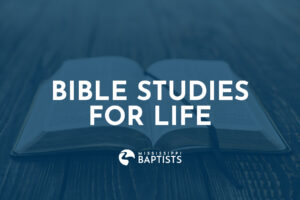Doing Life Together in Christ • 1 Thessalonians 5:4-15
By Carl M. White

There are many activities that can be solo sports. For instance, riding a bike or going fishing. It does not require a team to do either of these. But being a Christian is not a solo sport. You cannot be a good Christian by yourself. We need each other and it is God’s will that we be bound together in local fellowships called the church.
What is the difference between a social club and the church? Obviously, there are similarities. After all, both are made up of people and it is the nature of people to be social. But the gathering of the church has significant differences, and these differences are otherworldly. The Greek word koinonia captures the distinctiveness of the gathering of people as the church.
Often translated as fellowship, don’t make the mistake of assuming that this term refers only to something as simple as dinner on the grounds during homecoming. The essential meaning of koinonia is a spiritual union of people. It embraces concepts conveyed in English terms such as community, communion, sharing and intimacy.
It also refers to the joint sharing of a gift. What is the great gift that we all share in the church? The experience of knowing Christ Jesus as Lord. Thus, koinonia is a spiritual connection that originates from beyond us. It is other worldly. The word appears 19 times in the New Testament, and though it does not appear in our focal texts for today, its presence is all over it.
For example, “brothers and sisters,” is used three times in our text (vs 4, 12 & 14), and it implies koinonia. In the same way the repeated use of the simple plural pronouns “us” (6 times), “you,” (5 times), and “we” (3 times) ties all the believers Paul addresses to the common experience of being “children of the light” (vs.5).
To share the experience of knowing Christ as Lord is to be drawn into the light of truth. If we are of the light, then we are not of the darkness. Paul uses several descriptive words to expand on what it means to be in the light and not in the darkness. Children of the light are awake and sober. Those in the dark are asleep and drunk (vs 6 & 7). Children of the light are not appointed to suffer wrath but to receive salvation through Christ (vs. 9).
The implication is clear. Being part of the fellowship of believers keeps us aware, alert, and ready to respond to the leadership of the Spirit. One of Paul’s favorite ways to illustrate our awareness, alertness and responsiveness is talking about the armor of God (more fully presented in Eph. 6:11-13). Being sober and awake, we can put on the armor. He specifically names the breastplate and the helmet, though in this instance Paul refers to the breastplate as “faith and love” instead of “righteousness” as in Ephesians.
Taking such liberties in the use of an illustration demonstrates the fluidity and consistency that Paul uses in his letters. Constant in both instances is the function. The breastplate and the helmet are protective weapons. As Christians we face a world of darkness, and in koinonia we find our faith, our love, and our salvation strengthened, protecting us from the darkness of the world.
All of this is spoken of in the context of the second coming of Christ. This is the reference Paul is making in verse 4: “But you, brothers and sisters, are not in darkness so that this day should surprise you like a thief.” The second coming of Christ is the subject matter of the previous chapter.
This is how we encourage each other in the church. This is how we build each other up. We remind one another that He died for us and that we live together in Him as brothers and sisters.
In the fellowship that is the church we have three primary responsibilities — each are forms of encouragement.
First, to those who are hard workers, Paul charges the church at Thessalonica to “hold them in the highest regard in love” (vs.13). This is likely a reference to those who hold the vocational gifts of ministry, and others who use their gifts of the spirit to advance the work of the fellowship.
Second, to those who become idle, even disruptive in the fellowship. Koinonia requires that these be warned. Third, toward those who become disheartened, even weak, Paul says be patient and give encouragement (vs. 14).
White is a member of Pineview Church, Clinton.




